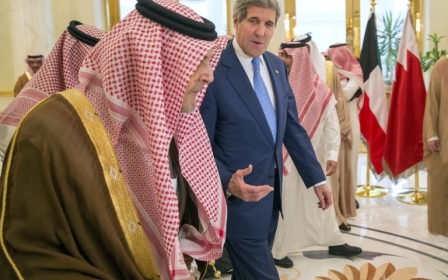IMF chief warns GCC about prolonged low oil prices

International Monetary Fund chief Christine Lagarde warned on Sunday that global energy prices could remain low for years and urged Gulf countries to adjust their budgets.
Speaking in Doha, the capital of Qatar, she met with ministers and officials from the six-nation Gulf Cooperation Council (GCC) and told them that their countries should no longer rely on revenues from oil and gas.
"We believe that the price of oil will probably persist at the level where it is for a number of years and as a result all GCC countries should undertake some degree of fiscal adjustment," she said at a news conference.
She said the IMF’s growth projections for the GCC would fall from 3.2 percent this year to 2.7 percent in 2016.
Lagarde also said that export revenues would be $275bn lower this year than in 2014 because of low energy prices.
The price of oil has dropped by more than half since the start of 2014, with Brent crude, the international benchmark, trading on Friday at $47.42 per barrel for December.
Lagarde said adjustments should include "firm control" on spending, particularly on public sector wages, and encouraging private sector growth.
"Well-planned fiscal consolidation strategies need to be put in place as soon as possible and communicated so that people understand how the adjustment will take place," she said.
She said the "size and urgency of this adjustment" varied for countries across the GCC, which includes Bahrain, Kuwait, Oman, Qatar, Saudi Arabia and the United Arab Emirates.
One of those countries urged to adjust is Qatar.
The 2022 football World Cup host has embarked on a huge capital-spending programme in recent years but at the same ness conference, Qatar's Finance Minister Ali Sherif Al-Emadi confirmed that his country would run a budget deficit next year.
"Given what we see today with oil prices, we expect that we are going to have a deficit and we are going to be realistic in terms of our approach," he said.
Qatar has previously admitted it is facing a fiscal shortfall of 4.9 percent of Gross Domestic Product in 2016 and of 3.7 percent in 2017 due to falling oil prices.
Earlier in the day Lagarde met the Qatari emir, Sheikh Tamim bin Hamad Al-Thani.
The emir said on Tuesday that he hoped the global fall in energy prices would help reduce dependency on the state in Qatar.
He warned of "wasteful spending, overstaffing and a lack of accountability" in the country at a meeting of Qatar's Advisory council, and raised concerns about "dependency on the state to provide for everything".
Stay informed with MEE's newsletters
Sign up to get the latest alerts, insights and analysis, starting with Turkey Unpacked
Middle East Eye delivers independent and unrivalled coverage and analysis of the Middle East, North Africa and beyond. To learn more about republishing this content and the associated fees, please fill out this form. More about MEE can be found here.




